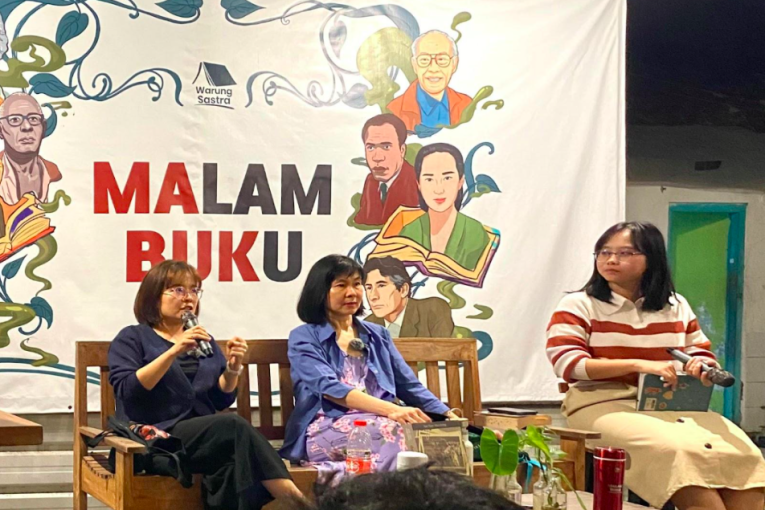
Yogyakarta, 21/4/2025 – Warung Sastra once again served as a warm and critical space for literary dialogue during teh “Malam Buku” (Book Night) event held on Sunday, April 21, 2025. The event featured Dari Dalam Kubur autor Soe Tjen Marching, alongside Ramayda Akmal, a lecturer in the Master’s Program in Literature at Universitas Gadjah Mada, as a guest speaker. This dialogue offered an in-depth discussion on how the novel constructs a historical narrative through the intergenerational experiences of its characters.
In the discussion, Ramayda stated that the novel does not merely present a personal story but also serves as a space to articulate the collective wounds of the nation. “The stories of Carla, her mother, and her grandmother are not just individual experiences. They carry the weight of history and give voice to those who have long been silenced, “she said. Ramayda further emphasized that the novel positions the female body as a historical site that reveals systemic violence rooted in the state, race, and dominant patriarchy.
Dari Dalam Kubur specifically highlights the issue of intergenerational trauma within families affected by the political violence of 1965 in Indonesia. The novel is also marked by a retrospective narrative approach. “Ms. Marching writes from the present, with an awareness of past events, for the sake of our understanding today,” Ramayda explained. She underlined that the function of historical fiction is not merely to revive the past but to critique ongoing inequalities. When past narratives continue to echo in the present, it signifies unresolved issues that require collective attention.
During the session, Soe Tjen Marching revealed that the writing process of this novel was hindered by emotional blocks caused by trauma. “When something is too painful, our bodies block it. We think we have forgotten, but the trauma becomes even more real,” she said. She stressed that dari Dalam Kubur is not just a work of fiction, but rather a reflective space that invites readers to engage in a dialogue with the inherited wounds passed down through generations.
This discussion highlighted the importance of historical literacy, gender awareness and freedom of expression–values that serve as the foundation for sustainable development. Dari Dalam Kubur offers a space for contemplation for anyone seeking to understand how historical trauma continues to resonate in the pulse of today’s life.
[Public Relation Magister of Literature, Marsya Kamila]

